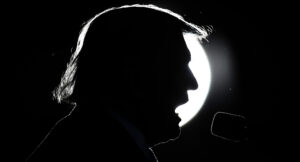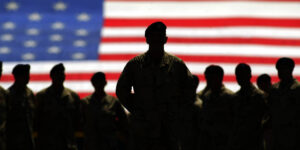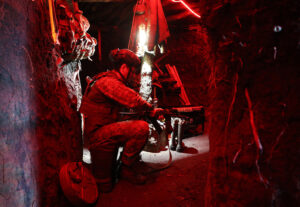Do you remember the Imperial Stormtroopers from the Star Wars movies, lurching around in their white plastic armour? When Obi-Wan Kenobi in the original movie said that no one else was as precise as Imperial Stormtroopers, he was clearly making a joke that Luke Skywalker was too wet behind the ears to catch. The one thing those movies make plain about Imperial Stormtroopers is that they couldn’t hit the broad side of a Death Star even if they were standing the length of one womp-rat away from it. Their job is to fill the air with blaster fire and miss. They do that job very effectively.
Anyone who knows anything about actual firefights involving professional soldiers will know that this isn’t what happens. (First-timers in combat, sure, but Stormtroopers are supposed to be competent.) In other words, Stormtroopers aren’t there to do anything useful. They’re there to provide the illusion of deadly peril so that the fake heroics of the protagonists look a little less unconvincing to movie audiences.
There’s a reason for this kind of absurdity, of course. Popular entertainment in Western industrial nations today is as thickly larded with moral posturing of this sort as anything Victorian parents inflicted on their children. In most popular genres, the basic premise is that the Good People always win, and the Bad People always lose.
That colossus of the modern imagination, J.R.R. Tolkien, has some responsibility for all this. In his programmatic essay “On Fairy-Stories”, he discussed one of the central plot schemes of fairy tales, which he called “eucatastrophe”: in plainer English, a sudden improbable turn for the better that saves the day when all is lost. As you’d expect from a devout conservative Christian like Tolkien, this theme is ultimately religious in nature — he described the resurrection of Jesus as the ultimate eucatastrophe — and it provided the frame for his two gargantuan fairy tales, The Hobbit and The Lord of the Rings.
To give him due credit, Tolkien went out of his way to make his eucatastrophes as plausible as he could. Most of the ninth-rate Tolkien imitators whose fetid output bathes the brains of today’s mass-media consumers stopped worrying about such petty concerns a long time ago. It doesn’t matter how much stronger and smarter and better armed the Bad People are; they have to lose because they’re the Bad People. Nor does it matter how idiotic the plan the Good People decide on, the Bad People are required to make the mistakes that will enable it to succeed. When the chips are down, you know that Harry Potter will always manage to drop the One Ring from his X-wing into the cooling port of Mount Doom.
This sort of silliness makes for dreary storytelling, but I’m convinced that it can also cause serious cognitive disabilities. Children who are raised on a steady diet of this kind of schlock are apt to end up thinking that this is how the world works. If they get out into the real world and bloody their noses a few times, they generally learn better, but if they live in a society that doesn’t let them fail, they may well reach adulthood without ever encountering that salutary lesson. Instead, they are seduced by Stormtrooper Syndrome: the conviction that no matter what, you’ll inevitably win because you think you’re morally superior to your enemies.
There’s no shortage of examples of Stormtrooper Syndrome these days, but I’m going to focus on the most important of the lot, the one that bids fair to transform the world’s political and economic landscape in the years immediately ahead. Yes, we need to talk about Ukraine. Now, this emphatically does not mean that we need to talk about who gets to claim the roles of Good People and Bad People. The unwelcome truth is that the outcome of this war does not depend on which side is morally better than the other. In the real world, in terms of military victory and defeat, who’s right and who’s wrong don’t matter once the cannon start to roar.
The roots of the Russo-Ukrainian war go back a very long time, but for present purposes we can begin in 2014 — when a coup overthrew Ukraine’s pro-Russian government and replaced it with a pro-Nato one. With the new regime in place, and following the Russian military incursion into eastern Ukraine, the US and its allies began funding a build-up that gave Ukraine the second-largest army in Europe. That army was armed and trained with an eye toward a massive shift in military affairs that was then underway.
In 2006, the Israelis launched one of their periodic incursions into Lebanon. To the surprise of many, the Hezbollah militia dealt the Israelis a bloody nose and forced them to withdraw with their main goals unachieved. The Israelis, like every other modern army at that time, used the tactics that had been pioneered by the Wehrmacht in 1939 and 1940, and perfected by Soviet and US militaries in the years immediately following: massive assaults by tanks and mobile infantry supported by air superiority, driving deep into enemy territory to get behind the defenders’ lines.
What Hezbollah demonstrated is that those tactics had passed their sell-by date. Having built a network of underground shelters and urban strongholds, they lay low while the Israeli vanguard moved past, then popped up and started clobbering Israeli units with sudden ambushes using state-of-the-art weapons. A decade later, the Ukrainian military imitated these tactics, building a massive network of defensive works just west of the Russian-held areas of the Donbas.
These defences were useful when the full-scale invasion came, denying Russia a swift victory and tying them into a gruelling stalemate. As strategies go, this was fairly good, but it had two serious weak points. The first was that it needed to be twinned with an economic sanctions package from the West that would succeed in breaking Russia’s domestic economy and forcing them to withdraw. The second was that it assumed the Russians would stick to pre-2006 military doctrine no matter how badly things went. That’s where Stormtrooper Syndrome first showed up. The decision-makers in Washington, Brussels, and Kyiv had convinced themselves that those weak points didn’t matter because the Ukrainians were the Good People and the Russians were the Bad People.
Then, last February, war broke out. At first, events seemed to play into the West’s hands. The Russians launched a classic Blitzkrieg operation, driving deep into Ukrainian territory, only to find that the Ukrainians fell back on prepared defences and urban strongholds. Some Russian units suffered embarrassing defeats; others found themselves overextended in hostile territory and retreated. Meanwhile, the US and the EU slapped sanctions on the Russian economy.
But that’s when the plan ran straight off the rails. The first difficulty was that most of the world’s nations didn’t cooperate with the sanctions. Some, such as Iran and China, that are hostile to the US saw the situation as an opportunity to extend a middle finger to their enemies. Others, such as India and Brazil that are non-aligned powers, saw the situation as a chance to demonstrate their independence. Still other nations wanted Russian oil and grain and weren’t willing to forgo them, so they acted in accordance with their interests rather than ours.
Yet there was another difficulty with the sanctions’ efficacy. Do you remember all those big corporations that loudly announced that they were leaving the Russian market? They couldn’t take their outlets and infrastructure with them, and so the Russians simply rebranded those and kept going. A soft-drink bottling company partially owned by Coca-Cola, for example, now produces something called Dobry-Cola in Russia. It tastes very similar to Coca-Cola, and it’s in a very slightly different red can. The crucial point is that the profits from sales of Dobry-Cola and similar products and services aren’t flowing out to stockholders in the US, they’re staying in Russia, where they’ve given a timely boost to the Russian economy. This presumably wasn’t what US and Nato elites had in mind.
But the worst news for Nato came from the battlefields. What happened there has an odd personal dimension for me. Some years ago I wrote an essay, “Asymmetric tactical shock: a first reconnaissance”, about what happens when an army becomes too dependent on complex technologies and its enemies figure out how to monkey-wrench those. The example I used came from the end of the Bronze Age, but the lesson applies more broadly: the monkey-wrenched army faces total disaster unless it does something most people these days can’t even conceive of doing. My essay circulated quietly among people interested in such things, and I have no reason to think that anybody in the Russian General Staff pays the least attention to obscure American fringe intellectuals like me. Yet the fact remains that when the Ukrainians monkey-wrenched the Russian version of Blitzkrieg, the Russians did exactly what I suggested an army in that situation should do: they fell back on an older form of warfare that wasn’t vulnerable to the monkey-wrenching tactics.
This is why the Russians abandoned their deep thrusts into Ukrainian territory, retreated from vulnerable areas around Kharkiv and Kherson, launched a mass-mobilisation of troops and a major expansion of their already large munitions industry, and got to work building entrenched defensive lines to guard the territory they had seized. Meanwhile, the Russian government strengthened ties with Iran and North Korea — two nations that have large munitions industries autonomous from Western technology and capital.
That is to say, since the new Ukrainian tactics made it impossible for the Russians to refight the Second World War, the Russians switched to First World War tactics. The defensive lines and urban strongholds on which the Ukrainians relied to defeat Russian tank columns didn’t provide anything like the same defence against massed Russian artillery bombardment. While the Russian Army was retooling for the new (or rather old) mode of war, mercenary units — Wagner PMC most famously, but there were others — took over the brunt of the fighting, tested out First World War tactics against entrenched Ukrainian forces in Bakhmut, and won.
This put Ukraine and its Nato backers into a very difficult position. In First World War-style combat, the winner is the side with the largest munitions industry and the biggest pool of recruits to draw on. Russia has a huge advantage on both counts. First, Nato countries no longer have a political consensus supporting mass military conscription, while Russia does. Second, while the US and its allies dismantled most of their munitions factories at the end of the Cold War, Russia did not, and it also has those good friends in Tehran and Pyongyang. All these give the Russians an edge the Nato nations can’t match in the near term.
This wasn’t a message that Nato was willing to hear. To a very real extent, it was a message they weren’t capable of hearing. It’s been 70 years — since the end of the Korean War — since the United States and its allies last fought a land war against a major power. The entire Nato officer corps got its training and experience in an era when they had overwhelming superiority over their enemies, and they have no idea how to fight without it. (Even then — Afghanistan comes to mind — they aren’t too good at winning.) That’s when Stormtrooper Syndrome really came into play, because it never occurred to Nato that Ukraine could lose — defined as they were as the war’s Good People.
And so the elites in Washington, Brussels, and Kyiv convinced themselves that the Russians couldn’t possibly ramp up their munitions industry to a pitch that would permit them to carry on trench warfare for years at a time. (Remember all those confident reports that insisted the Russians were about to run out of shells and rockets?) They told themselves that the Russians were using mercenaries because their army was too demoralised and brittle to stand up to the rigours of combat. They drew up plans for a grand Ukrainian offensive to turn the tide of the war, and funnelled more arms to Ukraine..
The counteroffensive began on 4 June. Two months on, it is clear that it has failed. A successful assault against fortified positions in modern war requires a three-to-one advantage in soldiers on that region of the battlefield, a large advantage in artillery, and air superiority. Ukraine has none of these things, and somehow or other no eucatastrophe showed up to save the day.
The Russo-Ukraine war isn’t over yet, and the fortunes of war may yet favour the Ukrainian side — though this looks very improbable just now. Meanwhile, history is not waiting around for the details to be settled. Towards the end of last month, the heads of state of 40 African nations gathered in St. Petersburg to sign agreements giving Russia a leading position in the economic and military affairs of the world’s second largest continent, while Russia’s defence minister was in North Korea negotiating further arms deals. It seems the Russians know better than to wait for miracles to save them from the consequences of their own actions.
None of this is to say that the mess in Ukraine is the only way that Stormtrooper Syndrome has shaped recent history; it’s just the most obvious example right now. It was because of Stormtrooper Syndrome, for instance, that so many people suffered nervous breakdowns when Donald Trump won the presidency in 2016, their reaction amounting to: “He’s a Bad Person, he’s not supposed to win!”. Afterwards, the same factor also kept them from wondering why so many disillusioned voters were willing to settle for Trump, of all people, as an alternative. Nor, to be fair, is Stormtrooper Syndrome in short supply on the Right, where shrill moral dualism is far more common than thoughtful discussion about how to deal constructively with the cascading crises overwhelming America today.
Really, it’s hard to name anything in contemporary Western life that hasn’t been twisted bizarrely out of shape by the efforts of our privileged classes to pretend to be the heroes of their own Star Wars sequels. Yet the lesson being whispered by the winds from Ukraine is that nobody and nothing else is required to play along. That lesson may end up costing a great many people bitterly in the not too distant future.
Disclaimer
Some of the posts we share are controversial and we do not necessarily agree with them in the whole extend. Sometimes we agree with the content or part of it but we do not agree with the narration or language. Nevertheless we find them somehow interesting, valuable and/or informative or we share them, because we strongly believe in freedom of speech, free press and journalism. We strongly encourage you to have a critical approach to all the content, do your own research and analysis to build your own opinion.
We would be glad to have your feedback.
Source: UnHerd Read the original article here: https://unherd.com/





